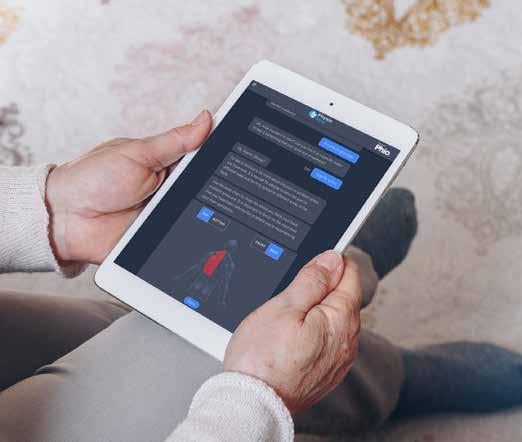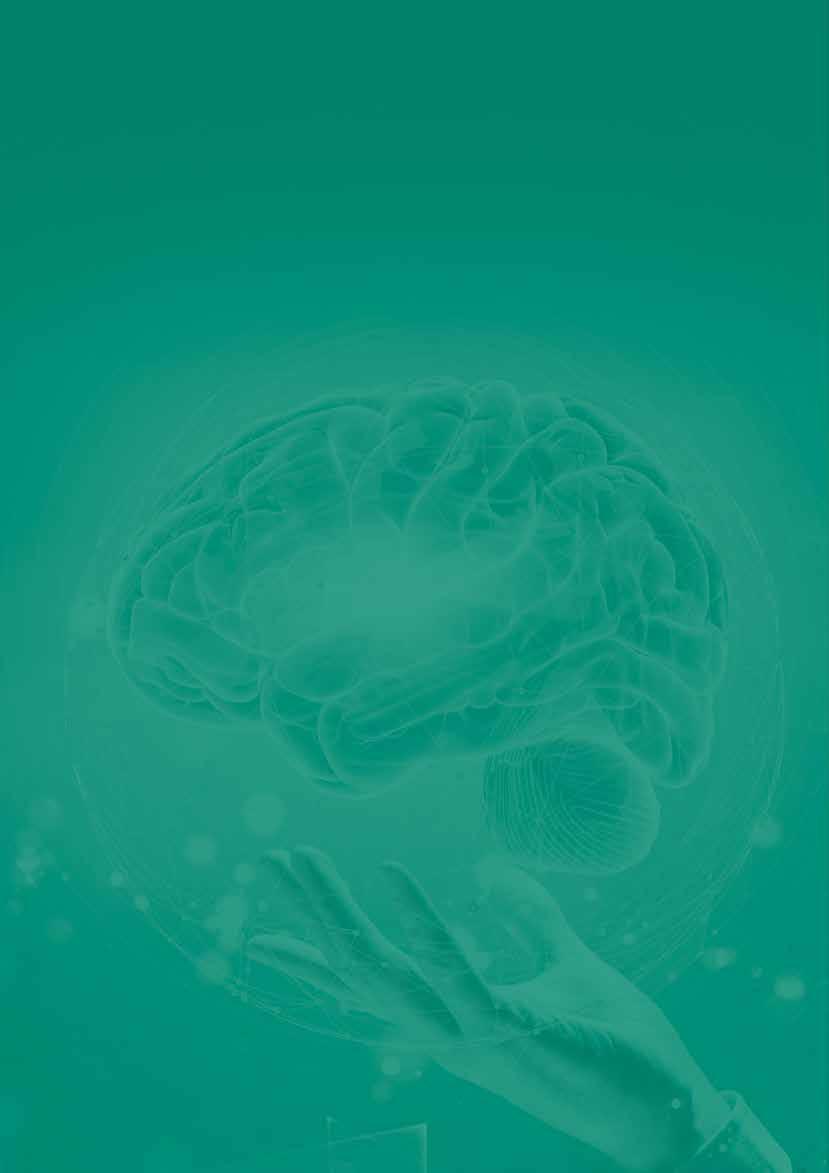
8 minute read
Swansea University Academies driving global healthcare transformation
Wales is leading the way by launching the first wave of specialised Intensive Learning Academies (ILAs) which will help create the next generation of global innovative leaders in health and social care. The academies, part-funded by Welsh Government, focus on critical policy areas for sustainable healthcare systems, including Value-Based Health and Care, Innovation and Preventative Health. Led by Swansea University and Bangor University, working with partners across Wales and globally, the Academies each offer a range of flexible courses designed for working professionals. These include intensive Executive Education programmes, Masters and Doctorate-level opportunities. Targeting learners from Wales, the UK and internationally from Health, Social Care and the Third Sector, as well as the Life Science Industries, the Academies offer great opportunities for professional development. Alongside education, the Academies are delivering a range of cutting-edge research and tailor-made consultancy services. This will support individual organisations to identify, develop and embed innovative practices that will help to meet the challenges facing health and social care. Swansea University’s Academies are hosted by its School of Management, and each specialises in a key future growth area for local and global health and social care markets:
l The ‘Value-Based Health and
Care Academy’ offers educational courses, research opportunities and consultancy services for
Value-Based Health and Care. For more information, visit: www. swansea.ac.uk/som/vbhcacademy
l The ‘All-Wales Academy for
Innovation in Health & Social
Care’ – a collaboration between
Swansea University, Cardiff and
Vale University Health Board,
Cardiff University and the Bevan
Commission – is focusing on innovation and transformation within health, social care and the third sector. For more information, visit: www.swansea.ac.uk/som/ innovation-academy/
The goal of the ILAs is to empower workforces around the globe with the expertise, skills and confidence to drive the redesign of health and care systems for the better, improving patient outcomes and experiences, while boosting the efficiency and sustainability of services. Educating learners from industry, health, and social care together is encouraging crosssector innovation and collaboration. This will allow the co-development of valuable skills and partnerships to support transformative health and social care. Cari-Anne Quinn, CEO at Life Sciences Hub Wales, said: “Ongoing innovation is essential to ensuring a pipeline of groundbreaking discoveries and developments. By uniting health and industry professionals and encouraging them to learn and work together, these academies will establish a foundation for sustainable and collaborative innovation for years to come.” Professor Hamish Laing, Director, ValueBased Health and Care Academy, said: “Wales is at the forefront of the global movement for Value-Based Health and Care, which is reflected in its recent designation by the World Economic Forum as a Global innovator Hub. The VBHC Academy builds on that excellence and international links to educate, conduct research and provide consultancy support to health and care organisations and industry partners around the world wanting to become value-based.” Professor Gareth Davies, Swansea Lead at the All-Wales Intensive Learning Academy for Innovation in Health and Social Care, commented: “The Academy offers a range of learning opportunities to develop leaders and managers, drawing excellence from across Wales and international networks. These include the Intensive Learning Week with the Bevan Commission, C&VUHB Climb Programme and MSc/Doctoral schemes. We look forward to welcoming the first cohorts from Health, Social Care and third sector, and supporting them in their development to benefit of the communities and citizens we serve.”
www.swansea.ac.uk/som/ila
Digital solutions paving the way for transformation
There is remarkable potential for digital healthcare technologies to improve diagnosis and treatment accuracy, care efficiencies and healthcare professionals’ workflows. The convergence of such technologies such as mobile phones, sensors, machine learning, artificial intelligence and imaging, together with standard medical practices, promises exciting advances and creates huge new market opportunities.
The Digital Solutions Fund (DSF), launched in May 2020 by Welsh Government and Coordinated by Digital Health Ecosystem Wales (DHEW), a collaboration between Life Sciences Hub Wales and Digital Health and Care Wales (DHCW), set out to identify and pilot innovative technology that could help accelerate the response to the pandemic and benefit patients for years to come.
Supporting those who answered the call
NHS assessors selected five digital health initiatives, with Welsh Government providing a £150,000 grant for the rapid piloting and evaluation of new digital platforms, applications and technologies - determining their long-term use and potential.

PhysioNow: Providing remote physiotherapy support
A clinically led, chat-bot support tool, PhysioNow – provided by Connect Health – provides a remote triage solution for Musculoskeletal (MSK) conditions such as arthritis and back pain. These are the most reported illnesses in Wales, affecting 887,000 people and placing a significant challenge on healthcare systems: covering 20% of GP appointments and 7.9% of hospital admissions. The pandemic increased difficulties in receiving system care, with routine referral pausing delaying MSK service access.
The DSF’s first project aimed to reduce health service strain by limiting unnecessary contact points, gathering more information from patients in advance and maximising staff capacity. And, by allowing patients to better support their own health, it aligned with the aims of Welsh Government’s ‘A Healthier Wales’ policy.
Unbound by typical service referral routes or opening hours, patients can self-refer for quick direction to the appropriate care pathway. Be it contacting 111, accessing urgent physio, or routine physio.
The Cwm Taf Morgannwg and Hywel Dda University Health Boards physiotherapy teams worked closely with Connect Health to agree appropriate information governance (IG) processes, adapt current referral and triage processes and communicate the pilot to GP clusters.
Over 16 weeks, the pilot enabled 1,029 patients to complete the remote physio triage, with 22% providing anonymous feedback. This was overwhelmingly positive: 81% stated they would recommend using PhysioNow to friends and family.

MedTRiM: Digitally supporting healthcare trauma management
The last year has shown how vital managing wellbeing is for healthcare employers.. What’s more, according to a recent Deloitte report, an average of £1 spent on supporting mental health sees employers get £5 back from reduced absences and staff turnover.
Health and care staff of all specialisms often find themselves in demanding and emotionally charged environments, with potential long-term physical and mental health consequences. This impacts staff welfare and long-term clinical services quality. MedTRiM is a medical trauma and resilience management programme to support those exposed to such pressures.
Originally developed for military personnel, Trauma Risk Management (TRiM) was repurposed in 2011 by DNA Definitive. Working in collaboration with Dr Mark Stacey, Associate Dean of New Initiatives at Health Education Improvement Wales and Consultant Anaesthetist at Cardiff and Vale University Health Board, they adapted and deployed TRiM in healthcare settings.
The result was a well-established resource for face-to-face learning, creating an atmosphere where healthcare staff can openly learn to support colleagues following traumatic experiences. However, Covid-19 interrupted the programme’s classroom delivery, although the pandemic’s pressures on healthcare staff meant MedTRiM’s need was greater than ever.
The DSF piloted the adaption of training into a digital delivery format to make MedTRiM courses accessible during the pandemic, while also exploring the potential of a long-term blended learning approach. Open to anyone working across NHS Wales, the course provides access to a digital framework and credible training for managing adverse psychological consequences of potentially traumatic events.
This ongoing project saw 322 digital learners from across Wales accessing the course online between October 2020 and May 2021, almost four times the delegates who could access the face-to-face programme in a similar period. Delegates represented a wide snapshot of healthcare professionals, including nurses, general practitioners, staff working in intensive care and anaesthetists.
As a result, Cardiff and Vale University Health Board is embedding digital MedTRiM as training for all theatre staff and support is being given to allow uptake in Betsi Cadwaladr University Health Board. There has also been UK-wide and international interest in the programme.
The digital MedTRiM course will remain available to NHS staff in Wales. DNA Definitive can now provide the training in three ways for healthcare professionals: online, face-to-face and blended.
Lessons learned
The Digital Solution Fund’s value is already beyond the individual successes of its first two projects. While those achievements must be applauded, learning from these pilots is being applied as new programmes come online. For example, ensuring developers understand the IG standards in Wales, which ensure appropriate handling and processing of patient data.
A key challenge to delivering change is creating mechanisms and support for rapid and scaled adoption of pilots. This must be planned from the outset, with sufficient time and a robust evaluation approach. The remaining three projects in the DSF’s pipeline are already applying such learning. These projects include Huma (formerly known as Medopad), a real-time remote patient monitoring system that allows clinical teams to assess, support and manage cardiac patients at home through a smartphone app. This builds on policies that are already allowing earlier discharge. CliniTouch Vie by Spirit Digital will explore remote monitoring of patients in care homes, and SPOT by Healthy. IO will deploy a wound assessment app that scans wounds, digitalises record keeping and shares images with relevant healthcare staff for further assessment. What began as a chance for businesses to support the Welsh Covid-19 response continues highlighting how we can transform lives through new ways of working, technologies and digital innovations.

A digital future
Life Sciences Hub Wales and the DHEW programme is built on experience of how industry can support with health and social care’s evolving needs. The Digital Solutions Fund applies that understanding to demonstrate how cross-sector partnerships can help drive innovation.
If you have an innovative idea or solution for improving an aspect of health or social care, please get in touch:
hello@lshubwales.com










